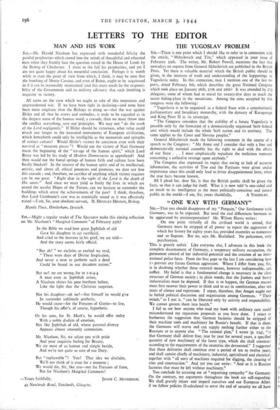" ONE WAY WITH GERMANY"
Six,—That you should disapprove of my "Penguin," Our Settlement with Germany, was to be expected. But need the real differences between us be aggravated by misinterpretation? Mr. Wilson Harris writes: On one point virtually all the civilised world is united, that Germany must be stripped of all power to repeat the aggression of which her history for eighty years has provided examples so numerous and so flagrant. But no, says Mr. Brailsford. No policemen, only psychiatrists. This is grossly unfair. Like everyone else, I advocate in this book the complete disarmament of Germany, a temporary military occupation, the permanent control of her industrial potential and the creation of an inter- national police force. From the first page to the last I am considering how ti prevent any future German aggression. Where I differ from you, Sir, is in doubting whether these external means, however indispensable, can suffice. My belief is that a fundamental change is necessary in the class structure of German society ; in plain words, that the Junkers and heavy industrialists must be deposed. If that is to happen, the German masses must first recover their power to think and to act in combination, after ten years of silence and repression. I argue, therefore, that Amgot ought not to forbid political discussion and organisation among Germans. " Their minds," as I put it, " can be liberated only by activity and responsibility. We cannot govern them into health?'
I fail to see how anyone who read my book with ordinary care could misunderstand my reparation proposals as you have done. I reject as barbarous the suggestion that German factories should be stripped of their machine tools and machinery for Russia's benefit. If that is done, the Germans will starve and can supply nothing further either to the Russians or to anyone else. "The rational plan," I wrote (p. 154), "is that Germany shall deliver free, year by year for several years, a specified quantity of new machinery of the latest type, which she shall construct according to the requirements of the countries she devastated." I suggested that these deliveries shall °continue over a period of ten to twelve years, and shall consist chiefly of machinery, industrial, agricultural and electrical. together with " all sorts of machines required for digging, the clearing of sites and construction." And yet you can write: "And so it is Russian factories that must be left without machinery."
You conclude by accusing me of " organising sympathy " for Germany. On the contrary, my arguments throughout the book are self-regarding. We shall gravely injure and imperil ourselves and our European Allies, if we follow policies ill-calculated to serve the end of security we all have in view. But I also think it important that we should understand the experience through which the mass of the German people has passed under the Nazi tyranny during the last decade. To that charge I plead [Mr. Wilson Harris writes: "I evidently made the mistake of thinking that when Mr. Brailsford wrote ' what this sick nation requires is not a policeman' he meant not a policeman. I had not overlooked his proposal al machinery for Russia by instalments, but it leaves unanswered the question what is to happen to Russian factories in the meantime."] Sta,—I profoundly deplore the trend of articles and letters appearing recently in The Spectator regarding our post-war relations with Germany. Mr. Swamimthan• and Mr. Sheldon suggest certain prohibitions, whilst Mr. Bateman's contribution to the pacification of Europe is to deprive Germany of her motor industry. Do these gentlemen really believe that these prohibitions are practicable? And if so, for how long would they be tenable? Have they been tried before and with what measure of success? Is not the perversion of the industries they mention a symptom of a malady which the policemen of Mr. Wilson Harris are to attempt a cure? In the multitude of effects, do we not tend to overlook the more difficult task of seeking a cause? It is so easy and so futile to postulate a mass of prohibitions of the material when the turbulence crying for remedy is a matter of the mind. It is this which makes appalling the vicious attack by Mr. Wilson Harris on Mr. Brailsford's new book. His deplorable article is stark advocacy of a return to the methods of Bedlam. The only inference to be drawn from his ill-timed incursion is that force and force alone is the remedy. It was a far wiser man than Mr. Wilson Harris who said that " Force is no remedy," and the same statesman observed that " you could not take a Great Power to Bow Street and bind it over." But Mr. Wilson Harris will have none of these things ; instead, he vies with Vansittart in black records, conveniently ignoring the fact that few nineteenth century records will bear close analysis ; he affords us no positive suggestion ; he relegates reason, as represented by the psychiatrist, to the realms of ridicule and makes Dr. Goebbels yet another handsome present. We shall do well to remember motes and beams ; we shall do better still to remember that regeneration comes "not by might nor by power, but by My Spirit saith the Lord of



























 Previous page
Previous page